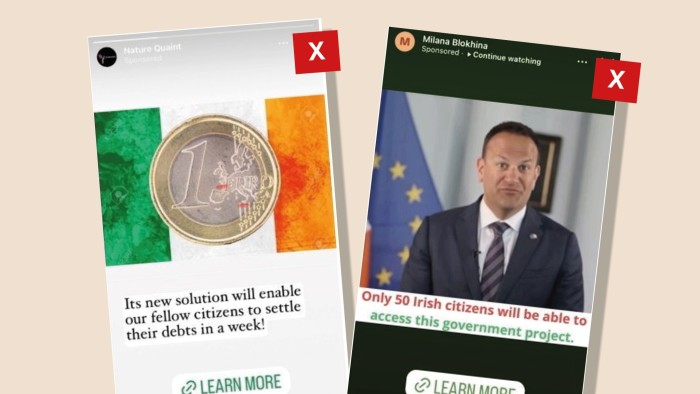Unlock the Editor’s Digest for free
Roula Khalaf, Editor of the FT, selects her favourite stories in this weekly newsletter.
The European Commission faces pressure from several member states to make social media platforms shoulder the burden of fighting online payments scams that defraud people out of billions of euros each year.
The initiative led by Ireland comes as US President Donald Trump pushes Brussels to scale back regulation of big American tech companies.
Brussels wants to introduce a right to automatic reimbursement from PayPal, Visa, Mastercard and banks for customers defrauded by scammers, under a commission proposal for payment services regulation under negotiation among EU countries.
But a suggested amendment to that proposal, submitted by the Irish finance ministry and gaining traction among other EU countries, would oblige Big Tech to check the legitimacy of advertisers before posting the ads.
Online scammers, using sophisticated ads prompting users to input their personal data, defrauded Europeans out of €4.3bn in 2022, according to the most recent EU figures.
Only adverts by registered financial service providers would be allowed in the EU under the Irish proposal, which was seen by the Financial Times. That would require a change to the regulations currently under negotiation.
“We can’t leave glaringly obvious holes in legislation that are allowing criminals [to] defraud people of their life savings,” said Regina Doherty, a European lawmaker from Ireland.
Google declined to discuss the talks but said it fought “financial fraud in ads through our tools, people and policies”.
Google has a financial services certification programme to help combat fraud, which is active in 17 countries. Financial services advertisers must demonstrate they are authorised by the national financial services regulators of countries where the ads will appear to post on Google.
Meta, the parent company of Facebook and Instagram, declined to comment.
Ireland says its proposed measures “focus on the actor placing the content, not the content itself . . . it merely requires that before an entity becomes an advertiser, the platform verifies that it is an authorised financial service provider”, according to the finance ministry note, presented in February.
About half of EU countries have expressed support, according to people close to the proposal. But the Irish plan has hit a roadblock.
The commission argues that requiring Big Tech to vet online advertisers for scams would contravene a provision in the landmark Digital Service Act that tech groups are not required to carry out broad-based monitoring of content, according to several EU diplomats.
But promoters of the Irish-led initiative have countered that a requirement to vet advertisers could be designed to conform with existing law.
“It’s not a can’t, it’s a won’t [on the part of the commission] and that’s why we’re exasperated,” Doherty, the Irish MEP, told the FT. She said relying on voluntary regulation by social media platforms was not enough.
The commission said they could not comment on “issues related to ongoing negotiations on legislative proposals”.
Poland, which holds the rotating EU presidency and is in charge of securing consensus on the legislation, remains unconvinced.
Warsaw has instead suggested simplifying communication between payment providers and platforms, which would then have to “remove or block access to content of relevance to the cause of the reported fraud”, according to a draft proposal.
The industry says that is too late and that legislators do not fully grasp the nature of investment fraud and the gap in legislation.
According to the Bank of Ireland, the country’s biggest bank and a champion of the Irish proposals, more than 75 per cent of its customers’ losses last year came from investment fraud.
Ads promoting online scams can be posted at scale then taken down at any time, often after the damage is done but before they reach the eyes of authorities. In many cases, victims cannot recover their money, while advertisers go on to post similar ads again in a different format.
“Once you report [the fraud through social media platforms], the event has taken place,” said Brian Hayes, chief executive of the Banking and Payments Federation Ireland.
“The EU Commission is trying to incentivise customers to invest in financial markets . . . But if this happens in real life to a consumer, they will be scarred for life and most likely never want to invest.”




